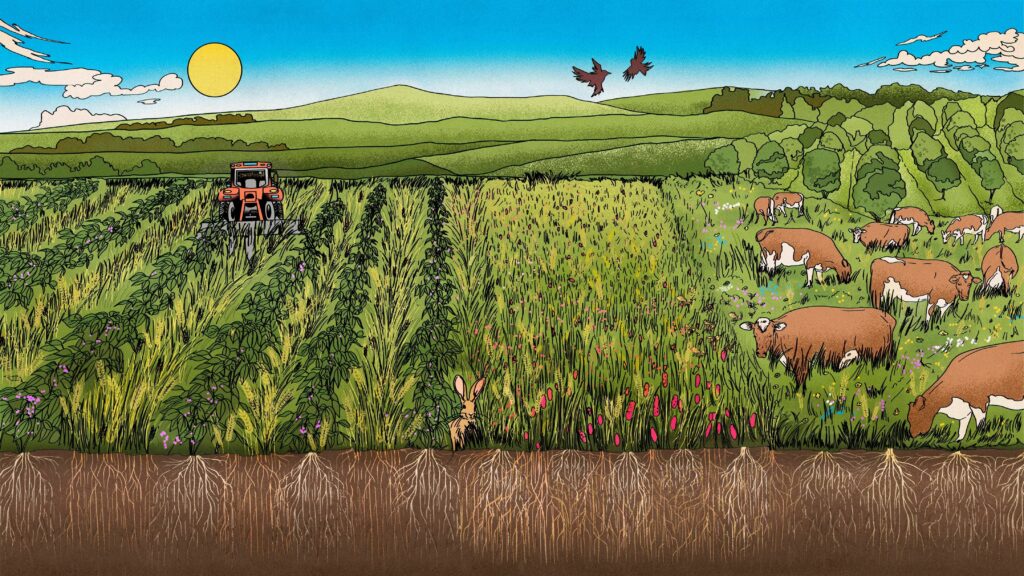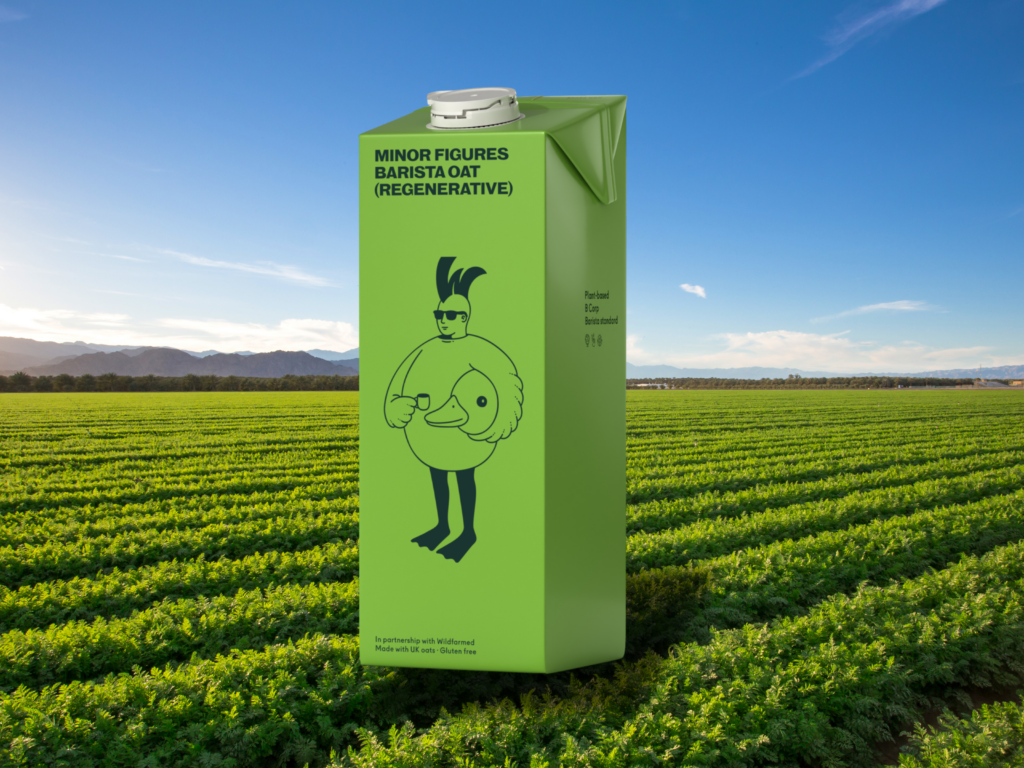
British oat milk maker Minor Figures has partnered with Wildfarmed to launch its first barista-style product with regeneratively grown oats.
Oat milk is already way more planet-friendly than dairy, generating 71% fewer greenhouse gases and using 92% less land and water each.
But some plant-based milk makers are looking to go one step further, tapping into regenerative farming to further enhance the climate credentials of their products.
“Oats are a regenerative powerhouse and a key part of our growers’ rotation – they rebuild soil structure, prevent nutrient loss, support soil biology, and increase resilience,” says Edd Lees, co-founder of Wildfarmed, a British company focused on regenerative agriculture.
Wildfarmed works with growers across the UK, who follow unique regenerative principles to produce wheat, barley and oats while ensuring positive measured outcomes for nature. The firm is now supplying its oats to London startup Minor Figures, which has launched a regenerative barista oat milk.
“We’re thrilled to be working with Wildfarmed to create a UK-first that’s pushing us closer to the future we want to see,” says the brand’s co-founder and CEO, Stuart Forsyth. “Barista Oat (Regenerative) takes advantage of Wildfarmed’s pioneering regenerative farming practices, which prioritise protecting people and the planet to create a product that’s in harmony with both nature and coffee.”
Is regenerative farming really sustainable?

Regenerative agriculture has been thrust into the spotlight with documentaries like Kiss the Ground, its sequel Common Ground, and Feeding Tomorrow, as well as the appointment of Robert F Kennedy Jr as US health secretary.
And while food companies have been accused of using it as a silver bullet to greenwash consumers, regenerative agriculture does have benefits for soil and nature – especially when used to grow crops, not livestock.
A recent study revealed that regenerative agriculture is the most effective approach for a just transition of the global food system, with the authors highlighting its “enormous potential to contribute to climate-resilient, equitable and economically sustainable protein production systems”.
“However, negative impacts associated with greenhouse gas emissions, freshwater extraction and livestock diversity need to be addressed,” they added.
According to Wildfarmed, the practice builds up soil resilience, reduces chemical runoff, lowers emissions compared to conventional farming, minimises water pollution, and is built on a knowledge-sharing environment.
One of its issues is that regenerative agriculture doesn’t have a standardised definition. In response to that, Wildfarmed drew up the UK’s first third-party-audited arable regenerative farming standards in 2023. By signing up to this, farmers commit to restoring ecosystems and prioritising nature-friendly farming.
Wildfarmed’s grower community focuses on five regenerative principles: they limit soil disturbance, maintain year-round soil cover (through cover and companion crops), promote plant diversity, keep living roots in the soil, and use plant analysis to determine nutritional inputs.
According to Minor Figures, Wildfarmed focuses on measurable outcomes and grants farmers the flexibility to achieve them in ways that suit their land, resulting in resilient farms, stronger local food systems, and higher farmer engagement.
Consumers embrace regenerative agriculture, and oat milk makers follow

Minor Figures says its regenerative oat milk is best suited for medium to dark roasts, drawing out the sweetness and helping deliver luxurious, silky-smooth, full-bodied coffee drinks. It’s part of the brand’s “planet-first, coffee-forward, and always delicious” mantra for the future.
“We’re really proud to be partnering with Minor Figures. This is an exciting moment for Wildfarmed, as it’s the first time our oats are being used in plant-based milks,” says Lees.
“Our goal has always been to accelerate the transition to regenerative agriculture, and Barista Oat (Regenerative) gives people the option to choose an oat that helps to support farmers and bring back nature-rich landscapes with every sip,” he adds.
The launch comes as acceptance of regenerative agriculture grows in the UK. One survey saw 56% of Brits agree about its sustainability and soil health benefits, with 37% saying they’d pay more for products that were farmed regeneratively. Globally, too, 60% of consumers think foods grown using this approach are better for the environment.
Minor Figures isn’t the only oat milk company putting regenerative agriculture in the spotlight. The market leader, Oatly, is investing in these practices across a third of its oat supply by 2030, rising to 90% a decade later and 100% by 2050. And as part of its diversity and equity commitment, it will support at least 100 oat growers in transitioning to regenerative farming.
British startup Glebe Farm, which produces the PureOaty line of oat milks, also leverages regenerative agriculture, and collaborates with its farm suppliers on practices like leaving fields fallow to support wildlife, and using dual-cropping systems to boost soil health and biodiversity.
Minor Figures’s new regenerative oat milk is available at Waitrose, and represents its latest attempt to keep on top of industry trends. It has launched a shelf-stable cold brew to cut down on at-home waste, functional oat milks with adaptogens and nootropics for targeted nutrition, and an Atomised barista oat milk powder for cafés to slash packaging waste and costs.
The post The Latest Sustainability Trend in Plant-Based Milk? Regenerative Farming appeared first on Green Queen.
This post was originally published on Green Queen.